~ 15 ~
DA TU VIDA POR EL EVANGELIO ~
“Al ver las multitudes, tuvo compasión de ellos…”
Preparo mi corazón para orar
Al comenzar, me tomo un momento para percibir la Presencia del Señor ante mí,
mirándome con amor, deseando hablarle a mi corazón.
En oración, leo Marcos Mateo 9, 35-10, 16
Después de leer en oración, pido una gracia que deseo en este momento de oración.
Usando mi razonamiento:
- Piense en lo que está sucediendo en la escena; ¿Cuáles son las palabras de acción?
- ¿Quiénes son las personas en la escena? Cuál es el lugar ¿Qué cosas se describen?
- ¿Qué palabras me llaman la atención? ¿Qué significa esto para mí?
Usando mi imaginación:
- Me imagino en la escena, ¿soy un observador o participante? ¿A quién me siento atraído?
- Usando todos mis sentidos, ¿qué veo? ¿Qué escucho? ¿Qué siento, huelo o pruebo?
Reflexiono sobre lo que Dios le dice a mi corazón:
- Mientras reflexiono, utilizo mis sentidos espirituales para reconocer lo que está ocurriendo en mi corazón: mis pensamientos, sentimientos y deseos. (Reconocer significa ver, notar, darse cuenta, nombrar).
Es importante hacer esto, ya que mis pensamientos, sentimientos y deseos dan forma a mis acciones.
- Busco la verdad que el Señor me está comunicando. Le pido a Jesús que me dé su mente y sus pensamientos para ver con los ojos de su corazón lo que hoy quiere revelarme. ¿Cómo me está llamando Jesús a aplicar esta verdad a mi vida?
Reflexión Guiada
Citado de “Una Introducción Ignaciana a la Oración”, por el padre Timothy M Gallagher, O.M.V1
Estoy con Jesús y sus discípulos mientras recorre los caminos de tierra y las aldeas de Galilea … Veo que las multitudes se acercan a él. Estoy allí mientras él se acerca a ellos, les enseña y sana a un gran número de ellos … Vivo con él los días de su misión apostólica de misericordia …
Miro su rostro mientras levanta sus ojos hacia la multitud, mientras siente la carga, el dolor, la confusión, la soledad de este pueblo. Son “como ovejas sin pastor”: nadie ve su necesidad, nadie se sana, nadie parece darse cuenta … Este es mi mundo hoy también …
Veo la profunda compasión que se mueve en su corazón, que lo mueve a dar su vida por ellos … Le pido el regalo de esa misma compasión en mi corazón …
“Rueguen, pues, al dueño de la cosecha que envíe obreros a recogerla”. Por tanto, reza… Le oigo decirme estas palabras, pidiéndome que dedique mi vida, mi oración, por los muchos que hoy son “como ovejas sin pastor…”
Lo veo llamar a cada uno de los doce, por su nombre, para ser parte de su misión salvadora … Ahora, lo escucho llamar mi nombre… ¿Cómo respondo?
“Les dio autoridad sobre los espíritus inmundos … y para curar toda enfermedad …” Siento el poder en él sobre el mal y sobre todo daño humano. Le pido ahora que comparta ese poder conmigo, que mi vida también sirva para vencer el mal, que yo también pueda ser una presencia de curación … que pueda ser su apóstol en este mundo …
Miro a cada uno de estos doce: Pedro, Andrés, Santiago, Juan, Felipe … Aprendo acerca de Jesús, y de aquellos a quienes elige … Le agradezco que me haya elegido … Le pido que renueve en mí el deseo de llevarlo a él a este mundo …
Lo veo enviarlos en misión … De dos en dos; salen inseguros, temerosos, llenos de deseo, con confianza en su poder … Yo salgo con ellos … a entregar mi vida por el Evangelio en la vocación que Dios me ha dado a mí Rueguen, pues, al Señor de la mies que envíe obreros a su mies.
Ahora escucho sus palabras: Ve … predica … sana … vive con sencillez … le pido que me explique estas palabras … que me muestre, a la luz de su llamado a proclamarlo a los demás, cómo estoy viviendo hoy, este año, ahora … le pido que me ayude a vivir estas palabras …
Te pido esta gracia en este tiempo de oración:
Conversa con Dios2
Reconocer:
- ¿Cuáles son los pensamientos que surgen en mi corazón? Yo creo …
- ¿Cuáles son los sentimientos que surgen en mi corazón? Yo siento …
- ¿Cuáles son los deseos que surgen en mi corazón? Yo deseo …
Relacionar:
Honestamente relaciono esto con Dios; le hablo a Él de esto, confiando en que está presente y escuchándome a mí, su amado hijo.
Recibir:
- Escucho lo que el Señor quiere decirle a mi corazón, sabiendo que Su amor es gratuito e incondicional. Recibo su amor y consuelo. Confío en que Él anhela consolarme, animarme, fortalecerme, curarme, perdonarme…
- Le permito a Él que me guíe; quizás volviendo a la escritura …
Responder en oración:
- Concluyo mi tiempo de oración hablando con Jesús, con Dios Padre y / o el Espíritu Santo como le hablaría a un amigo. También puedo invocar la intercesión de María y los santos. (San Ignacio llama a esto un coloquio).
Alábalo – doy gloria a Dios por quien es; por ser todo bueno y amoroso; por ser mi Señor y salvador…
Agradécele – por nuestro tiempo juntos; por su palabra para mí; por los regalos que me ha dado hoy …
Pídele … por ayuda, gracia, fuerza, sabiduría, fe más profunda…
- En base a lo que Dios está diciendo a mi corazón, me propongo actuar de la siguiente manera concreta para amar a Dios y amar al prójimo (que podría ser algo pequeño). Hoy voy a …
Descansen en el Señor:
“Quédense quietos y sepan que yo soy Dios”
Psalm 46, 10
1 Gallagher, T., 2008. Una Introducción Ignaciana a la Oración: Reflexiones Bíblicas Según los Ejercicios Espirituales. Nueva York: The Crossroad Publishing Company.
2 Esta forma de conversar con Dios en oración a menudo llamada RRRR (ARRR por sus siglas en inglés) es enseñada por elInstituto para la Formación Sacerdotal de Omaha Nebraska. Para obtener más información, consulteFather Traynor, Scott (2013) La Parroquia Como Escuela de Oración y, Dwyer, Karen y Lawrence (2011) WRAP Yourself in Scripture (Publicaciones de IPF).













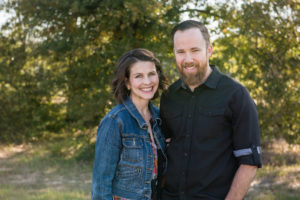


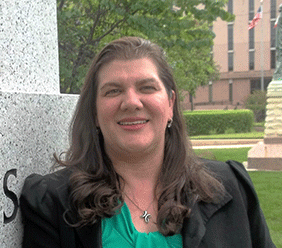
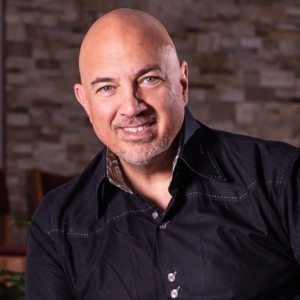
 Kimberly Kay Cox
Kimberly Kay Cox







 Mark Mogilka
Mark Mogilka














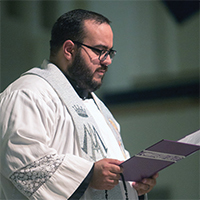



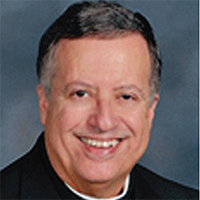










 Armando Cervantes
Armando Cervantes Anna Betancourt
Anna Betancourt
 Andrea Chavez-Kopp
Andrea Chavez-Kopp